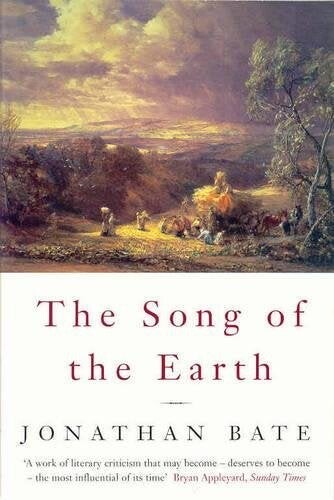The Song of the Earth
As we enter a new millennium ruled by technology, will poetry still matter? "The Song of the Earth" answers eloquently in the affirmative. A book about our growing alienation from nature, it is also a brilliant meditation on the capacity of the writer to bring us back to earth, our home.
In the first ecological reading of English literature, Jonathan Bate traces the distinctions among "nature," "culture" and "environment" and shows how their meanings have changed since their appearance in the literature of the eighteenth century. An intricate interweaving of climatic, topographical, and political elements poetically deployed, his book ranges from greenhouses in Jane Austen's novels to fruit bats in the poetry of Les Murray, by way of Thomas Hardy's woodlands, Dr. Frankenstein's Creature, John Clare's birds' nests, Wordsworth's rivers, Byron's bear, and an early 19th century novel about an orangutan who stands for Parliament. Though grounded in the English Romantic tradition, the book also explores American, Central European, and Caribbean poets and engages theoretically with Rousseau, Adorno, Bachelard and especially Heidegger.
The model for an innovative and sophisticated new "ecopoetics," "The Song of the Earth" is at once an essential history of environmental consciousness and an impassioned argument for the necessity of literature in a time of ecological crisis.
Bio
Sir Jonathan Bate is a Foundation Professor of environmental humanities with a joint appointment in the Department of English and the Global Futures Laboratory, School of Sustainability.
Praise for this book
An engaging, closely researched selection of poets whose mediating powers between humans and the natural world have helped restore our links to the earth.Bate (English/Univ. of Liverpool) clearly illustrates the importance of poetry in expressing the human bond with nature. ... An eccentric but worthwhile study.
Kirkus Reviews
This ambitious, erudite critical study from literature professor Bate seeks to recast Romantic poetry from the Wordsworthian 'egotistical sublime' to an ecological one. Romantic literature's love of nature, its fierce individualism and its political radicalism make it a plausible candidate for planting the seeds of the Green movement. ... Bate formulates his own idea of "ecopoesis," a poetics of human habitation within nature, instead of pastoralism's facade. Poetry, in effect, imagines locally and inspires globally for Bate.
Publishers Weekly
